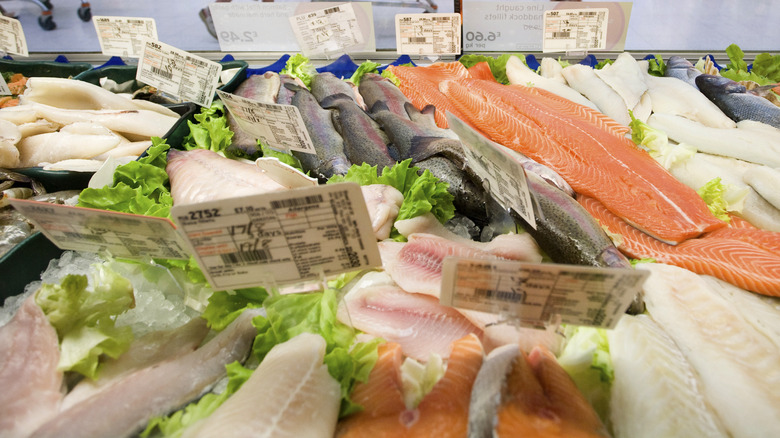The Sneaky Thing Grocery Stores Do With Fish
When you walk into a supermarket looking to buy some high-quality fish, there's a good chance you won't leave with what you had in mind. Whether you're shopping for red snapper or sea bass, you could be the victim of a seafood scam as many as nine times out of ten (via Forbes). According to the New York State Attorney General's Office, who released a report in 2019, the levels of fish fraud at supermarkets across that state have been rising for years — but what exactly is so fishy?
It's called "species substitution," according to Forbes and it's exactly what it sounds like. It's when stores label one type of fish (usually a cheap kind, like giant perch or Nile tilapia) as another higher-ticket item, notes CNN. In so doing, they are taking advantage of the fact that, once cut into fillets, different types of white fish can be almost impossible for the average consumer to tell apart, Forbes adds. This means that when you're spending premium dollars for what you think is a special seafood, you could be getting ripped off, paying as much as $23 per pound for a fish worth less than $3 per pound!
A sea of grocery stores and restaurants are scamming people
According to some studies, red snapper could be mislabeled as much as 67% to 90% of the time, while something like lemon sole could be fraudulent in up to 88% of cases, notes Forbes. However, in addition to this actual bait and switch, some supermarkets go farther, labeling farm-raised fish as "wild" and "drug-free," implying it's of a higher quality and more eco-friendly, when in reality it's none of those things (via Quartz).
Before you quit buying fish from supermarkets altogether, be warned: grocery stores aren't the only ones taking part in this ruse. Restaurants might be even more guilty of seafood scamming, since their fish is "usually presented under sauce, in breading, seasoned, or otherwise disguised," says Forbes. In fact, an investigative report by conservation group Oceana published at CNN, found that one in three stores and restaurants "sold at least one mislabeled item." And it's not an issue only confined to the US, with fish and chip shops in the UK being repeatedly exposed for selling endangered species of sharks, like hammerheads and spiny dogfish, as generic white fish (via The Guardian).
So, how can you avoid getting sucked into a seafood scam? The best way to be sure of what you're getting is to eliminate the middle person and go straight to the source. Buying from a local fishmonger lets you see the whole fish, check the eyes and skin for signs of freshness, and ask an expert if you're feeling uncertain (via The Daily Meal).

